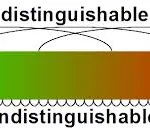The Sorites Paradox Of Stopping Injustice And Imposing Values

We often see horrible things happen in our world. Wars, theft, murder, oppression. When we see these things, we feel compelled to stop them. And if we have the means to stop them, we feel that it is our moral obligation to do so. But life is complex and not always straightforward. When does intervening go from stopping injustice to imposing your social, cultural values on another society? That is the question. The Sorites Paradox of stopping injustice and imposing values.
This is a tough question to answer, and I liken it to the Sorites Paradox. The Sorites Paradox goes; “A certain amount of grains of sand is a heap of sand. Removing a single grain of sand does not turn the heap of sand into a non-heap. But if you repeat the process of removing grains of sand, eventually you get to one grain of sand, which is not a heap.”
Essentially, what something is, is clear at the very end, but there is a huge portion in between where it is unclear. It is unclear where exactly one mode (heap of sand) becomes the other mode (grain of sand). Likewise, in many cases, such as the committing of genocide, where it is clear that the action being done is evil and must be stopped. But there are other times where an action being done may seem bad to one culture, but be acceptable to another.
When does an action go from being evil and must be stopped, to being a cultural difference? Or, when does an action go from being clearly one side in the wrong, to part of a nuanced, complex situation? This question applies to both domestic and international actions.
For example, if one really thought that a dictator could rise, it might be justified to use undemocratic means to stop that person. But if the figure was not in fact a threat to be a dictator, such an action would be evil. This is the conundrum you have with the left’s reaction to Donald Trump.
They are simply wrong that Trump is a threat to be a dictator. Thus, their attempts to keep Trump off the ballot are immoral. Their actions are in fact those of totalitarians. But in very complex, fraught situations, it is possible for good people to make a mistake on something like this, and act in a way that is evil. That doesn’t necessarily make them evil.
Clearly, what the left is doing to Trump is not one of those times. Trump simply represents an alternative point of view to the ruling class. They and many rank and file leftists, are imposing a straw man view of Trump that bears no resemblance to reality. Donald Trump triggered something in them that made them lose their common sense and decency. So this is a case where the left should be blamed for what they are doing. They are not good guys who made a wrong decision in a complex situation.
But in many instances, going full throttle is essential to stopping an enemy. The dropping of the atomic bomb on Japan to prevent a land invasion that would have possibly led to over a million deaths. The firebombing of Dresden. The acts may have been monstrous. But in the context of being necessary to stop an existential threat, they were not.
And for those who say they still were, lets perform an exercise. It is unfalsifiable, but consider this. If dropping an atomic bomb was necessary to win the war, should it be done? Meaning either drop bombs on Japan and firebomb Germany, or lose the war, and have fascism and genocide rule the world.
It’s easy to take the moral high road now, living in a world that is only possible because of the actions you condemn. Of course, the complicating factor is that things are usually not as cut and dry as WW2. There could be two sides fighting, with both seeing the other as an existential threat. If the other side is an existential threat, doesn’t that justify any action to win?
That is a Sorites Paradox. Hitler is an example where it is clear that extreme measures to win are defensible. On the other side, if you have two states warring over a piece of land, no side has the moral high ground. But in between is where the questions lie.
In almost any conflict, both sides can give a perspective that paints their side as in the right and the other in the wrong. We do not live in movies to TV. We live in real life. And in real life, who is right and who is wrong is not cut and dry. So in that case, if one side does something extreme, are they right, or are they evil? Do they have legitimate reason to think that need to do something extreme?
The correlating problem is that if the idea that you are under existential threat justifies extreme actions, anyone can claim that is how they felt, to escape the moral condemnation. There is a line where we say not recognizing you don’t need to be extreme should be seen. But where is it?
In certain instances, even if someone is wrong to see their cause as existential, we do not morally condemn them for their actions. We underhand their thought process. If you think you need to bomb the other side to keep from being exterminated, even if that did not happen to be the case, there is an understanding.
But if you are completing a war of conquest, then saying you bombed the other side because of existential fears will not morally cut it. The problem that arises is that we use logical arguments as guidelines. But these logical arguments come from the obvious examples. The examples of either a heap of sand or a grain of sand. But usually, the actions come in situations where we are in between the heap of sand and the grain of sand.
The same problem is present in acting internationally. If we see a nation committing genocide, it is a moral duty to stop it if we can. This was the case of the Serbian genocide of Kosovars in the late 1990s. But should we intervene to stop societies that force women to wear burqas? Societies that kill people for being gay?
One person’s “we must stop oppression” is the other person’s “they have different values.” And of course, this can be taken to the extreme. There are people in the US who think that even not allowing gay marriage is reprehensible. What’s to stop taking that to the extreme? Leftists might use US power to topple any government that doesn’t allow gay marriage. It could lead them to advocate the US toppling Japan’s government. As Japan does not allow gay marriage.
So what is the answer to this problem? Honestly, there is no clear cut answer. Because what I have just outlined can make people of good faith and good morals do things that are evil. And such people are necessary, so as not to let true evil to win.
While Jesus said to “turn the other cheek,” that does not do when confronted by true evil. For the greater good, harsh actions must be taken. But without delicately balancing that with context and morality, it can turn all people evil. You cannot condemn anyone who ever gets this wrong, as you’d end up condemning good people who do fight evil. But “I felt…” cannot be an excuse, as it gives actual immoral people a way out.
This is it. The Sorites Paradox of stopping injustice and imposing values. Events in the world are so complex, it’s hard to imagine ever having a template for action to answer this question. Especially for all eventualities. So what to do? Try your best to follow moral codes. Be aware of all the complexities of these situations. Be aware that this is an eternal problem of human action towards evil. And pray that you make the right decision.


